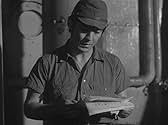A conscience-driven Japanese soldier traumatized by the events of WWII adopts the lifestyle of a Buddhist monk.A conscience-driven Japanese soldier traumatized by the events of WWII adopts the lifestyle of a Buddhist monk.A conscience-driven Japanese soldier traumatized by the events of WWII adopts the lifestyle of a Buddhist monk.
- Nominated for 1 Oscar
- 4 wins & 3 nominations total
- Kobayashi
- (as Takeo Naito)
- Baba
- (as Akira Nishimura)
- Director
- Writers
- All cast & crew
- Production, box office & more at IMDbPro
Featured reviews
These scenes are when Mizushima fully realizes the extent of what war is all about. It's not about pride and hope, it's about putting your life on the line. He is accepted by the Buddhist church and decides to stay and live a simple life, honoring the dead through prayer and burial. His men try to persuade him using a talking parrot switcheroo, teaching a parrot to say `come home to Japan, Mizushima' and giving it to him. He, in reply, sends back his parrot, which he taught to say `no, I am staying here.' It is a pacifist sentiment throughout, a great film covering the human emotional perspective on war in a unique way.
Ichikawa's iconic piece contains a strong anti-war theme that survives beyond its 1945 setting. Mizushima's troop are timeless, soldiers dreaming of homes, wives, town festivals; clinging to nostalgia to guide them home and fighting on for each other rather than any greater cause inspired by the imagined national community. Much more identifiable with the period are the troop holding out against the British even after national surrender, fanatics looking to die for an Emperor who has forsaken them rather than return to their families and rebuilding of the community. Among these men, there are no songs.
Mizushima's conversion from soldier-musician to selfless monk symbolises a state of reflection that follows all armed conflict. The film has been criticised for failing to confront the barbarism of the Imperial army, but this lack of identification with specific national failings is what gives the film a theme that transgresses to other cultures, conflicts and evils - the coming to terms with a life to be lived in the aftermath of horror. The flaws on the Yamato spirit may not be interrogated, but the atrocities of war are present, most visibly in Mizushima's encounter with the rotting flesh of fallen comrades being picked over by scavenger birds.
The framing is impeccable, and those looking for a quintessential Japanese aesthetic will be surprised by the extensive use of closeups. The music is spare and suitably evocative of military camaraderie and frightened young men coping far from home. Mizushima's journey is both symbolic and highly plausible, as is the reaction of his brothers-in-arms. Great cinema in its own right, and at the very top of the tree in anti-war movies.
In July, 1945, a Japanese platoon in Burma gets captured by the British army. One of the men - named Mizushima - has to go to the mountains to convince another Japanese platoon to surrender. But the latter platoon refuses to do so and all the members get killed in a shootout. As Mizushima walks back to his platoon, he comes across the bodies of more soldiers who perished in the war. Thus he sees his new mission in life: no longer can he be a soldier, but becomes a Buddhist monk, with the aim of healing all affected by the war.
I see Mizushima as representing what Japan as a society had to do following its defeat in WWII. Aside from the fact that the Land of the Rising Sun has had to be a pacifist country (the US forced it to have a constitution prohibiting military intervention), the bombing of Hiroshima made the Japanese people averse to militarism in general. Certainly this movie's anti-war stance makes it all the more relevant in this day and age. I recommend it.
What's really sad is that you can't get the movie on DVD!
Did you know
- TriviaViewers familiar with Godzilla (1954), may recognize many of the cues present in The Burmese Harp's soundtrack, as composer Akira Ifukube adapted Godzilla's requiem theme into several pieces heard throughout the film.
- GoofsThe modern harp (with its pedal changes and its consequent ability to make changes of harmony, in particular)that is played throughout on the film's soundtrack does not match the much more basic instrument shown in the film.
- Quotes
Captain Inouye: [Excerpt from Mizushima's letter, which Captain Inouye reads to his men as they sail back to Japan] As I climbed mountains and crossed streams, burying the bodies left in the grasses and streams, my heart was wracked with questions. Why must the world suffer such misery? Why must there be such inexplicable pain? As the days passed, I came to understand. I realized that, in the end, the answers were not for human beings to know, that our work is simply to ease the great suffering of the world. To have the courage to face suffering, senselessness and irrationality without fear, to find the strength to create peace by one's own example. I will undergo whatever training is necessary for this to become my unshakable conviction.
- ConnectionsFeatured in Burden of Love (1955)
- SoundtracksHanyuu no Yado
(Japanese Version of 'Home Sweet Home')
- How long is The Burmese Harp?Powered by Alexa
Details
- Release date
- Country of origin
- Languages
- Also known as
- El arpa de Birmania
- Filming locations
- Production company
- See more company credits at IMDbPro
Box office
- Gross US & Canada
- $20,015
- Opening weekend US & Canada
- $4,569
- Oct 20, 2024
- Gross worldwide
- $33,763
- Runtime
- 1h 56m(116 min)
- Color
- Sound mix
- Aspect ratio
- 1.37 : 1































